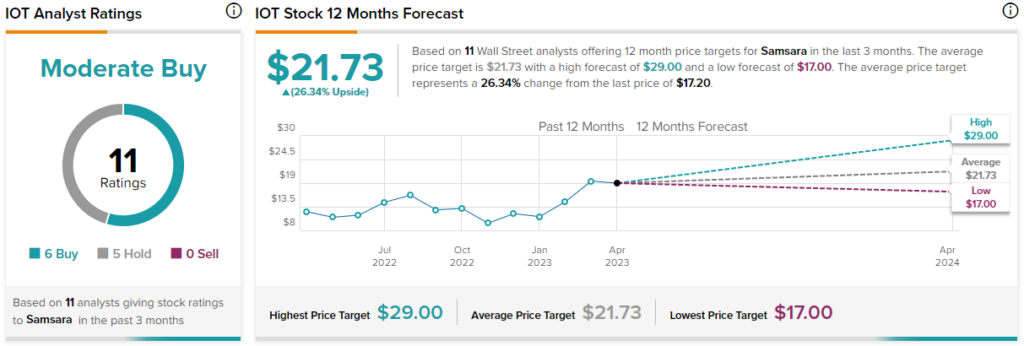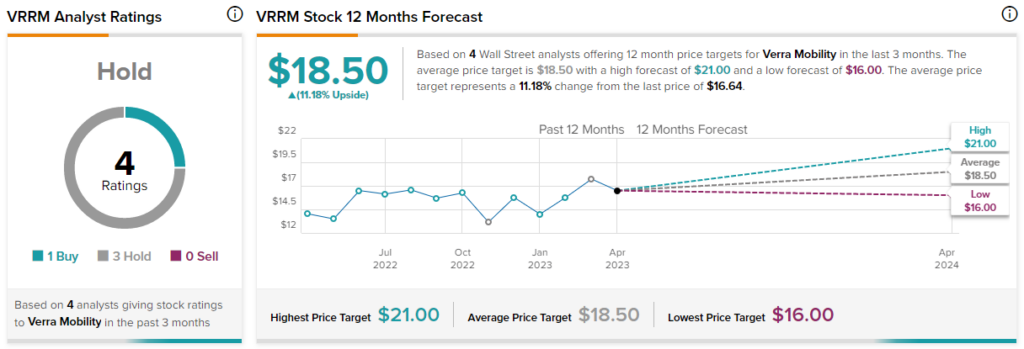In this piece, I evaluated two Internet of Things (IoT) stocks, Samsara (NYSE:IOT) and Verra Mobility (NASDAQ:VRRM), using TipRanks’ comparison tool to determine which is better. Both companies deal in mobility, with Samsara focusing on fleet management and Verra taking a broader view, targeting smart mobility solutions like street safety cameras and solutions for toll and violations management.
Elevate Your Investing Strategy:
- Take advantage of TipRanks Premium at 50% off! Unlock powerful investing tools, advanced data, and expert analyst insights to help you invest with confidence.
A critical difference between these companies is that Verra Mobility is profitable while Samsara is not. Despite its lack of profitability, Samsara has soared year-to-date, climbing more than 44% to bring its 12-month gain to more than 35.9%. Verra Mobility stock is up 16.4% year-to-date, accounting for almost all of its 12-month gain.
As a result, investors may be wondering if there’s any room for upside left in either name, so a closer look is in order.

Samsara (NYSE:IOT)
Samsara is trading at a price-to-sales (P/S) ratio of about 14.6. There are very wide ranges of P/S and price-to-earnings (P/E) ratios in the technology industry, making determining an appropriate valuation challenging. However, due to its lack of profitability and high P/S multiple relative to its revenue, a bearish view seems appropriate for Samsara at this time.
Samsara is focused on the fleet management industry and offers a GPS fleet management platform. Meanwhile, the company’s revenue has been skyrocketing, more than doubling in 2021, climbing 71% in 2022 and 52% for the year that ended in January 2023.
However, despite its soaring revenue, Samsara’s net losses remain roughly stable in the $250 million to $350 million range over the last several years. The company’s net income margin rose from -83% to -38%, so there is a significant improvement there, but it still has much to prove.
Ultimately, investors should decide whether a company with $652.6 million in revenue for the last 12 months deserves a market capitalization of over $9 billion. Of note, Samsara insiders have unloaded over $145.5 million worth of shares via auto-sell transactions over the last three months, so even they seem to think the company could be overvalued.
What is the Price Target for IOT Stock?
Samsara has a Moderate Buy consensus rating based on six Buys, five Holds, and zero Sell ratings assigned over the last three months. At $21.73, the average Samsara stock price target implies upside potential of 26.3%.

Verra Mobility (NASDAQ:VRRM)
There’s no doubt Verra is trading like a growth stock. However, its valuation multiples, profitability, stable gross margins, positive and growing free cash flow, and other fundamental factors suggest a long-term bullish view might be appropriate for now. Additionally, even a cursory glance at other Internet of Things stocks reveals much higher valuations for unprofitable companies.
Founded in 2016, Verra Mobility isn’t even 10 years old yet, so the fact that it’s profitable already speaks to management’s capabilities. In fact, the company even repurchased over $130 million worth of its shares in 2022, demonstrating shareholder-friendly practices.
Verra Mobility offers smart technology aimed at improving driver behavior and road safety, including red-light, speed, school bus stop arm, and bus lane safety cameras. It also sells automated license plate readers. The company’s platform offers a suite of solutions that support all these technologies.
Verra Mobility is trading at a P/S multiple of 3.4 and a P/E multiple of 29, versus its mean P/S of 4.7 since November 2018. After plummeting from its high P/S of around 7.0 times in mid-2021, the company is trading at roughly the same valuation it was trading at during the second half of 2020.
Therefore, the stock’s current level looks like a solid entry point, even after the 16.4% year-to-date gain.
What is the Price Target for VRRM Stock?
Verra Mobility has a Hold consensus rating based on one Buy, three Holds, and zero Sell ratings assigned over the last three months. At $18.50, the average Verra Mobility stock price target implies upside potential of 11.2%.

Conclusion: Bearish on IOT, Long-Term Bullish on VRRM
Macro trends for the mobility section of the Internet of Things market are positive, making the sector worth a look. One estimate stated that the mobility-as-a-service (MaaS) market was valued at $3.3 billion in 2021 and projected it to be worth $40.1 billion by 2030, a compound annual growth rate of about 32%. With Verra Mobility’s broader approach to the MaaS market, it looks like a better play than Samsara, which focuses only on fleet management.
Finally, Verra Mobility is profitable but trading at a P/S ratio in the low-single digits, while unprofitable Samsara simply looks overvalued with its P/S ratio in the mid-single teens. Of course, there is another caveat with Verra Mobility. While it looks like a great long-term play, this stock is volatile, so caution is advised, especially if it continues to rise to a fair valuation in the near term.
















